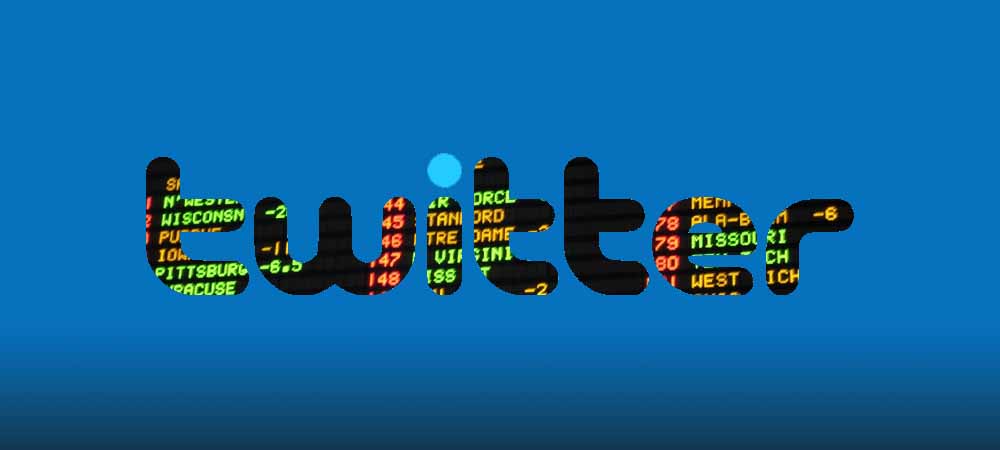- Twitter executive David Herman said in an interview that if the company could integrate into the sports betting world, “…that would be great.”
- Mentions of the term “sports betting” are up 22% from last year, indicating an increase in interest in the activity among Twitter’s user base.
SAN FRANCISCO – Twitter has had a rough few years from most vantage points: the stock is down 15% since their last quarterly report went public (it showed a $537 million net loss for the quarter); they just settled a shareholder lawsuit (originally filed in 2016) for $809.5 million; and top-level executives have spent much of the last two years embroiled in scandals, ranging from questions over censorship to a very public feud with the President of the United States.
Twitter does have one thing trending positively, however, and that is sports engagement.
So far through the 2021 NFL season, Twitter users have sent an average of 250,000 tweets per game, an 11% increase from last year. College football is seeing similar growth on the social media platform, with a 33% increase in unique tweet authors per college football game compared to last year.
Twitter And The Sports World
Twitter has long seen sports as a potential avenue for growth. Twitter used to broadcast full-length NFL games, though they have since changed course on that strategy. Currently, they run a popular poll for a noon college football game each Saturday, allowing users to choose a unique camera view for the remainder of the game.
However, Twitter may be in a prime position to take advantage of a different avenue – sports betting. With over half of the states legalizing sports betting in some fashion, wagering on sports has never been more popular. Twitter’s trends bear that out: the term “sports betting” is up 22% this year, while “fantasy sports” has increased 11%.
This fact is not lost on David Herman, the man in charge of Twitter’s U.S. Sports Partnerships.
Can Twitter Integrate Itself Into The Sports Betting World?
“Every single day, there’s more and more conversation and more and more happening in the sports betting world,” Herman said in an interview with Front Office Sports.
“We think Twitter is a platform that plays well into gambling-related conversations. We’re live. We’re real time. That’s what betting is. Betting and gambling have long been a core component of sports conversations on Twitter. Now things are legalized, more sports betting brands can be advertisers on Twitter than in the past and as leagues are partners with official betting operators, it’s getting more visibility and exposure on a daily basis,” he said of the role Twitter can play in the sports betting world.
When asked if and how the company might leverage their position in the social media world into a lucrative position in the sports betting world, Harmon said “We are consistently looking for new ways to enhance the user experience and at some point as it relates to betting, that could be great.”
There are some things holding them back for now, however. “There are a lot of complicated components for us. There are only certain states where it’s legal so far, so we are still evaluating the space as a whole,” he said.
What Twitter does to further integrate itself into the sports betting world in the future remains to be seen, but one thing is a near certainty: Twitter will have to integrate itself with the sports betting industry at some point, or another social media company will. The popularity of sports betting will only grow from this point, with more states regulating the industry and providing more options to bettors – if Twitter fails to adapt, they may be left behind by a large user base
Advertising Disclosure
In order to provide you with the best independent sports betting news and content LegalSportsBetting.com may receive a commission from partners when you make a purchase through a link on our site.
News tags: College Football | David Herman | NFL | Twitter

Jerad has been a welcomed addition to the LegalSportsBetting.com writing team. Covering topics regarding the expansion of sports betting in the US, Jerad focuses on legislative efforts, bill signings and other methods for sports betting legalization. Finishing his education as a college baseball player, Jerad has first-hand knowledge of competitive sports, paired with years of personal sports betting as well. As a political science major at the University of Central Florida, Jerad covers the political, legal, and legislative aspects of sports gambling without any issues.


 College Football Betting
College Football Betting Best Online Sports Betting
Best Online Sports Betting Best Legal NFL Betting
Best Legal NFL Betting States With Legal Sports Betting
States With Legal Sports Betting Sports Betting Events
Sports Betting Events




